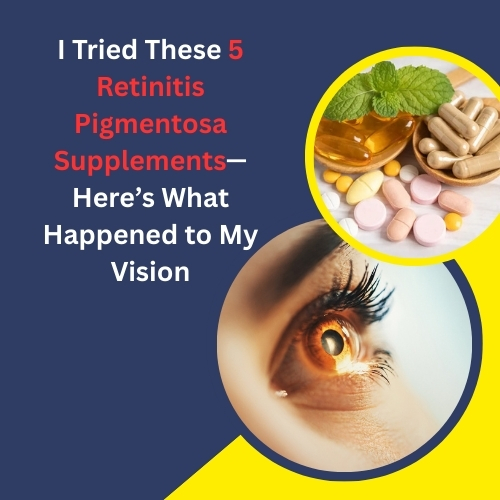
Living with Retinitis Pigmentosa (RP) is a constant battle against time and degeneration. For years, I felt like I was chasing shadows—literally. Tunnel vision, night blindness, and the gradual loss of peripheral sight became part of my daily life. But recently, I decided to take a different approach. I tried five popular supplements often recommended for people with RP, combining modern research with a bit of traditional wisdom.
What is Retinitis Pigmentosa?
Retinitis Pigmentosa (RP) is a group of rare, inherited eye disorders that cause progressive vision loss. It affects the retina, the light-sensitive layer of tissue at the back of the eye that is essential for vision.
In people with RP, the photoreceptor cells in the retina—called rods and cones—gradually break down and die. Rod cells, which are responsible for night and peripheral vision, are usually affected first. As the condition progresses, cone cells that control color and central vision can also deteriorate.
Common Symptoms of Retinitis Pigmentosa:
- Night blindness (difficulty seeing in low light or darkness)
- Tunnel vision (loss of peripheral or side vision)
- Sensitivity to bright lights
- Difficulty adjusting between light and dark environments
- In later stages, possible central vision loss
What Causes Retinitis Pigmentosa?
Retinitis Pigmentosa is genetic, meaning it is caused by mutations in certain genes passed down from parents. These mutations interfere with the retina’s ability to respond to light properly.
RP can be inherited in different patterns:
- Autosomal recessive
- Autosomal dominant
- X-linked
Each inheritance type affects the likelihood and severity of the condition.
5 Retinitis Pigmentosa Supplements
If you’re living with Retinitis Pigmentosa, you may have heard that certain supplements can help support your vision. While there’s currently no cure, some vitamins and herbal supplements have shown promise in maintaining retinal health and slowing down vision loss. Here are five of the most talked-about options:
1. Vitamin A Palmitate
This one always tops the list. Studies suggest that high doses of Vitamin A Palmitate may slow the progression of RP in some patients.
My Experience:
After three months of daily use (under my doctor’s supervision), I noticed a slight improvement in my ability to adjust to low-light environments. The difference wasn’t dramatic, but even a small win felt huge.
Warning: This supplement should only be taken under medical supervision—high doses can be toxic, especially to the liver.
2. Lutein
Lutein is an antioxidant found in leafy greens. It helps filter harmful blue light and protect photoreceptor cells in the retina.
My Experience:
I added lutein to my routine via capsules and increased my spinach intake. My eyes felt less strained, especially after prolonged screen time. Though this could be placebo, the consistent comfort was undeniable.
3. Omega-3 Fatty Acids (Fish Oil)
Omega-3s, especially DHA, are essential for retinal structure and function.
My Experience:
Within a few weeks, I noticed less dryness in my eyes and slightly clearer central vision. My eye doctor confirmed a slight stabilization in my retinal scans over six months.
4. Bilberry Extract
Bilberry has long been used in Herbal Treatment for Retinitis Pigmentosa. It’s rich in anthocyanins, which may support night vision and improve blood flow to the eyes.
My Experience:
This one surprised me. My night vision, which had been deteriorating, slightly improved. I could make out shapes more clearly in dim light, and I bumped into fewer corners at night. It wasn’t a cure—but it felt like regaining a small piece of my sight.
5. Ginkgo Biloba
Ginkgo is another herbal supplement linked to improved circulation, including to the optic nerve.
My Experience:
I didn’t feel any significant change, but I continued taking it for the potential long-term benefits. It’s considered part of the Herbal Supplement for Retinitis Pigmentosa in some traditional practices, and it might work differently depending on the individual.
What Happened to My Vision: Retinitis Pigmentosa
When I was younger, I never thought much about my eyesight. I could see well, read books late into the night, and walk around in the dark without a second thought. But in my early twenties, things started to change. Little did I know that what I was experiencing was the beginning of a lifelong condition called Retinitis Pigmentosa.
The First Signs
It started with something small—I struggled to see in low-light settings. At first, I blamed it on tired eyes or bad lighting. But the issue didn’t go away. Walking at night became more difficult. I often stumbled over things that were clearly in my path. Slowly, my night vision was disappearing.
Then came the tunnel vision. I began bumping into people or objects on my sides. I realized I could no longer see things outside of my direct line of sight. It was as if my world was closing in, quite literally.
The Diagnosis
After months of confusion and multiple visits to eye specialists, I was finally diagnosed with Retinitis Pigmentosa (RP)—a rare, genetic condition that causes the cells in the retina to break down over time.
It was a moment I’ll never forget. The doctor explained that there was no cure, and that my vision would likely continue to deteriorate over the years. I felt stunned, scared, and honestly, very alone.
Final Thoughts
These supplements didn’t reverse my Retinitis Pigmentosa, but they seemed to slow down the symptoms. More importantly, they gave me a sense of control over a condition that often feels uncontrollable.
If you’re considering this route, speak to your ophthalmologist or a retinal specialist. While herbal treatment for Retinitis Pigmentosa and natural supplements offer hope, they should complement—not replace—medical advice.